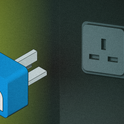As I mentioned in an earlier column, I am looking for some software which will help prolong my children's innocence. But preventing undesirable words or images from entering our family computer from the internet is not easy. So far I haven't found a programme which will screen them out. In the meantime you might like to hear about a crude early programme which requires the user to enter all the words considered offensive. Fair enough. Some poor chap bought the software and put "breast" on the forbidden list. His wife went on the net a few days later, looking for new ideas for a dinner party. No recipes made it to the screen which required her to buy "breast of chicken," "breast of duck" and so on. Another example of the doctrine of unintended consequences, or just stupidity on the part of the programmer?
@
On a recent trip to the US, while walking through a shopping mall in Santa Monica, California, I spotted an advertising hoarding in the middle of the walkway. You know the sort-they are common enough over here: triangular pillars fronting on to glass displays which, in this case, advertised Burger King, a local florist and a web site for a firm which made household furniture. The furniture company did not have a shop in the mall; all it seemed to have was a site on the internet. I suppose that as you are rushing through the mall with your shopping falling out of your bags, trying to stop little Duane from murdering Peggy Sue, you are supposed to stop and make a quick note of the http://www details, then check it out later.
@
Encyclopaedia Britannica is now available on-line. I don't know when it first went live but it is currently advertising like mad in the US. It's a subscription service, but a small demo is available at http://www. eb.com. It says that it has 65,000 entries on-line, and it is building on these all the time. Encyclopeaedia Brittanica has taken 225 years to evolve to this point-but evolve it has. Debrett's is only just becoming available on CD. A shame, that, but let's hope Debrett's reads this column and gets the message. Then all we need is Wisden and Whitaker's Almanack and my joy will be complete.
@
American buses driving along their non-super highways now have web addresses emblazoned across them. Even the small ads in the national and local newspapers are frequently decorated with either e-mail or web addresses. A company called Travelbase, speaking from the classified section of the New York Times, invites you to go to http://www.travelbase.com/ oceankey/ to inspect the Ocean House hotel. You are encouraged to look at the bedrooms, and even take in a sunset at its Key West resort. However, I was somewhat shocked that it also showed you (perhaps unintentionally), a picture of a rather handsome but plainly naked heterosexual couple enjoying a glass of champagne together in the bubble-filled giant size bath which comes as standard. Try as I might, I could see no wedding ring on any of the lady's fingers. Just think how some people might interpret this scene.
@
General Motors has also gone into cyberspace. The address is http: //www.gm.com/ and it claims to allow visitors to survey the full GM product line and get an idea of what you might want to buy. I say "claims" because, frankly, the site was so busy when I went to see it that I could hardly bear the delay before even simple instructions could be completed. I abandoned all hope of ever using the much-trumpeted virtual reality drive facility. ("We want to create a 'buzz' so that people will tell each other 'you've got to check the GM site,'" a GM representative declared confidently.) But even with a very fast modem and computer, much activity on the internet is really quite impractical for anybody except people who have hours to waste and someone else paying the telephone bills. It's fine for text, but moving pictures and sound really slows things down. The process will have to speed up enormously before multimedia on the internet can really take off. However, GM might have hit on something. Now you won't have to listen to all those persuasive half-truths from car salesmen.
@
I received a neat little e-mail from GO2, or "The Guardian On-line" as it is more prosaically known. It has initiated a debate on the "stakeholder economy," about which you might have heard a lot lately. The Guardian modestly says it has created "the first true forum for political debate published on the Net by a British national newspaper." How "true" this is remains to be seen, and since only three or four "British national newspapers" are on the internet at all, it is not really a very large claim. But if you like that sort of thing (I do), what the Guardian has done is remarkable enough. It says it has brought together "around 100,000 words about stakeholding including all the key speeches, news and comment, background material, a quiz, and an extract from the best-selling The State We're In by Guardian assistant editor Will Hutton." A quiz about "stakeholding"? I can hardly wait. n
John Carr
You can contact the Net Position on: 100643.455@compuserve.com











